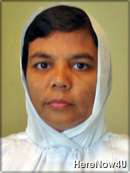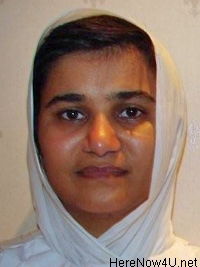 |  |
| Samani Prasanna Pragya | Samani Vikas Pragya |
Samani Prasanna Pragya gave a talk on 17 July in the continuation of the series of lectures on 6 avshyaka and the third Avashyak Vandana - "An integrated personality by bowing in reverence". This lecture was completed in two parts on Sunday, 3 July as well as on the 17 July.
An Integrated Personality by Bowing in Reverence
by Rajiv Shah
Respected Samaniji gave salutations to Gurudev, fellow Samaniji and addressed - Brothers & Sisters.
Commenced talk by reciting story of Rsabhdeva. He had 2 wives - Sumangala and Sunanda. He had 99 sons with Sumangala of whom Bharat was the eldest. With Sunanda his son was Bahubali (means mighty army). They received training in arts and crafts. Bharat was an ardent warrior and politician. At the time of Rshabhdeva’s renunciation he distributed his kingdom to his sons. Bharat received Vinita (present day Ayodhya) and Bahubali received Taksila (present day in Bihar) and the other 98 sons received different parts of the kingdom. Bharat was an ambitious warrior wanting to be emperor of whole India. He therefore demanded all other kings to accept his superiority or fight. His 98 brothers surrendered, but Bahubali did not. He was too proud to surrender. Both Bharat and Bahubali were brave and courageous and if war was raged then there would be unfathomable bloodshed. Councillors decided to have a dual instead of war. Bharat tried to fight using various weapons but had no success in winning over Bahubali and was becoming desperate to gain victory. He broke the rules of engagement and threw a powerful weapon “Chakra” towards Bahubali in order to kill him. However, the nature of Chakra is such that it cannot injure a person of the same blood and thus the chakra returned to Bharat. Bahubali became furious and decided that he will not spare Bharat at all. Everyone trembled at the sight of Bahubali getting ready to kill his brother Bharat. As Bahubali raised his hand, a flashing though came to his mind - “How can I kill my brother for the sake of mere land? I’ve always respected him.” However, due to pride and ego, he further thought that how can my raised hand return empty handed and instead of killing his brother he brought his hand towards his own head and plucked out his hairs and became a monk at that very instant. Ego still had a firm grip over him and he thought how could he go to his father’s assembly where his 98 younger brothers were at an advanced spiritual stage and bow down to them. He therefore stood in deep and resolute meditation at that very spot in total kayotsarga for 1 year. Creepers grew on his body, birds made their nests, insects sucked blood from his body and oblivious to all external trials and tribulations Bahubali was adamant and confident to get enlightenment on his own.
Deep meditation requires stillness / stability of body. This is the primary condition. Example, pitcher has water which moves as the pitcher moves. To make the water still, you need to make the pitcher stable. Similarly, making body still is a precursor to making the mind and soul stable.
Bahubali was still not getting enlightenment. Through such a severe penance he had shed various karmas and yet he could not obtain enlightenment.
One day his sisters asked Lord Rsabhdeva as to the whereabouts of their brother Bahubali. Lord replied that Bahubali is in deep meditation. Sisters enquired why is he still not getting enlightenment? Lord explained that it is due to shallow pride which prevents him from getting enlightenment. His sisters came to him due to affection and fondly kept on singing “Oh my Dear brother, get down from the elephant”. Although in deep meditation he recognised the voices of his sisters and thought that my sisters are nuns and always speak the truth. Why are they singing get down from elephant even though they can see I am not on an elephant. He contemplated and realised that get down from elephant means relinquish the elephant of ego which is preventing me to get enlightenment. He understood that his hesitation of bowing down to his younger brothers was the cause of his lack of enlightenment. He deeply regretted this and immediately decided to go to them at Lord Rsabhdevas assembly. Just as he took his first step, he immediately obtained kevaljnana.
Integrated personality means to attain kevaljana. The audience brainstormed as how this definition could be applied to Bharat’s story narrated:
- Bahubali’s ego was a hurdle to attain kevaljnana
- This led to anger (war between brothers) - relation between brothers broker
- Bahubali didn’t want to respect his younger learned brothers
- Bharat wanted to expand his empire. Due to this greed, war was waged.
- Deceit (maya) does not bring victory. Bharat broke the rules of engagement during the dual.
- As soon as Bahubali gained humility and wanted to offer salutations to his brother he gained kevaljnana/
Bowing down (salutation, reverence) is the third of the Avasyakas (essentials for all, householders & ascetics)
Samaniji posed questions to the audience for discussion:
- What is personality
- How many kinds of personality are there?
- What is integrated personality?
- Why should one develop a wholesome personality?
- What is ego?
- How is ego an obstacle in achieving total personality?
She stressed that people need to think about current affairs and not spiritual ideals such as attaining moksha.
Samaniji explained the following:
- Etymologically, the word Personality derives from the root in Latin Persona which means a kind of mask to resonate with the voice of an actor. Personality, thus denotes projection / impression, etc.
- Types of personality
- Power of attraction è outward personality (e.g. make up, dressing, etc)
- Power of impression è intellectual (education, degrees) & mental (confidence for self control, focus, concentration, memory power, etc)
- Power of expression è may not be good looking, but has compassion, kindness, wins heart of others (emotional personality, able to control ego, anger, deceit, hatred, fear, etc)
To quantify the types of personality, Samaniji indicated that
- Power of attraction è physical personality, health, beauty, etc contributes 20% towards integrated personality
- Power of impression contributes 30% towards integrated personality
- Power of Expression contributes 50% towards integrated personality
Samaniji explained that in the corporate world, before the selection criteria was based on IQ (Intelligence Quotient), then was based on EQ (Emotional Quotient) and now SQ (Spiritual Quotient) is given importance.
The above types of personality are even discussed in modern psychology.
According to Samaniji, examples of people who have integrated personality are Swami Vivekananda, Acarya Mahasramana, etc
Why should one develop a wholesome personality
- To gain success
- To get solutions to problems
- To awaken inner power
By having a Guru it helps us in dropping our Ego.
- Means I am / I know everything. Implies disrespect to others (Ekantvada)
- How is ego an obstacle in achieving a total personality è Confidence is positive, self esteem is positive, ego is negative. Garava (pride) in good things is beneficial and in false / bad things gives you pride and that’s ego
- I am nothing is not allowed; I am something (self esteem/pride) is required; I am everything is Ego which is harmful
Vandana - Related to paying homage and respect to Gurus / Acaryas and one of the six essential Avashayaks of a Jain.
How can you recognize the right Guru for you?
- You feel joyful just by thinking about the Guru
- If you have a Question in your mind, but just by thinking about your Guru the answer is fulfilled
- Before visiting Guru you may have several questions which all disappear when you are in front of your Guru.
- When you remember your Guru in any circumstances, you get the feeling Guru is assisting you and supporting you even if he is not with you.
Why is it important to have a Guru?
By having a Guru it helps us in dropping our Ego as stated in the Uttaryadhyan Sutra. The 3 benefits of doing Guru Vandana (bowing down to a Guru) are
- Destroys “neech Gotra” - lower status making karma and attain or attract “Ucch Gotra” - higher status making karma. The examples of Marichi and Krishna bhagwan were shared.
- Those who bow down get the ability of unobstructed command.
- Efficiency and Proficiency in their field due to politeness and courtesy, as there is reduced pollution of mind which improves concentration.
The extra benefits of Guru Vandana are:
- Destruction of lower status making karma and attraction of higher status making karma
- Longevity
- Knowledge
- Fame
- Power
Importance to Guru was emphasised as they are the ones who can make us understand about God, otherwise we can’t recognise God. There is a famous saying that bow first to Guru and then to God. According to scriptures, right Guru is SuSadhu ie one who follows and adopted 5 great vows and has self-restraint. Guru is different from teacher as teacher teaches knowledge whereas Guru guides us or shows us right path. A householder can be a Guru if he follows the life of a Sadhu. Best way of finding a Guru is looking out for an Acarya from a good Order or tradition.
Samaniji gave the following quote:
- You are lucky if you get a Guru in your lifetime
- You are luckier if you can surrender to such a Guru
- You are luckiest if Guru bestows his blessings on you
- You are unlucky if you haven’t found a Guru
- You are unluckier if you have come across a guru but could not recognize him
- You are unluckiest if you have found a Guru but not surrendered.”
The sessions were very informative and inspirational. The correct way of performing Vandana was also demonstrated.
Photos:
 See report: ttp://www.herenow4u.net/index.php?id=79934 See report: ttp://www.herenow4u.net/index.php?id=79934 |
 See report: ttp://www.herenow4u.net/index.php?id=79934 See report: ttp://www.herenow4u.net/index.php?id=79934 |
 See report: ttp://www.herenow4u.net/index.php?id=79934 See report: ttp://www.herenow4u.net/index.php?id=79934 |
 See report: ttp://www.herenow4u.net/index.php?id=79934 See report: ttp://www.herenow4u.net/index.php?id=79934 |